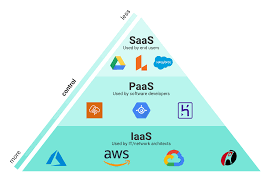The Power of Cloud Computing Services
Cloud computing services have revolutionised the way businesses and individuals store, manage, and access data. By leveraging remote servers hosted on the internet, cloud computing offers a range of benefits that have transformed the digital landscape.
Scalability and Flexibility
One of the key advantages of cloud computing services is their scalability. Businesses can easily adjust their storage and computing resources based on demand, ensuring optimal performance without overpaying for unused capacity. This flexibility allows organisations to adapt to changing requirements quickly and efficiently.
Cost-Efficiency
Cloud computing services operate on a pay-as-you-go model, eliminating the need for costly infrastructure investments. By outsourcing IT resources to cloud providers, businesses can reduce capital expenditure and operational costs while maintaining access to cutting-edge technologies and services.
Accessibility and Collaboration
With cloud computing services, data is stored in a centralised location accessible from anywhere with an internet connection. This enables seamless collaboration among team members working remotely or across different locations. Real-time updates and file sharing enhance productivity and streamline workflows.
Data Security and Reliability
Leading cloud providers invest heavily in security measures to protect data from cyber threats and ensure compliance with industry regulations. Data redundancy and backup solutions offered by cloud services guarantee high levels of reliability, minimising the risk of data loss due to hardware failures or disasters.
Innovation and Competitive Edge
Cloud computing services empower businesses to focus on innovation rather than IT maintenance tasks. By offloading infrastructure management to experienced providers, organisations can allocate resources towards developing new products, improving customer experiences, and staying ahead in today’s fast-paced digital economy.
Conclusion
In conclusion, cloud computing services represent a paradigm shift in how technology is leveraged to drive business success. The scalability, cost-efficiency, accessibility, security, reliability, and innovation capabilities offered by cloud solutions make them essential tools for modern enterprises seeking growth and competitive advantage in an increasingly digital world.
Advantages of Cloud Computing Services for Business Operations
Assessing the Security of Data Storage in the Cloud
An Overview of Different Cloud Computing Service Models
5. Strategies
- What is cloud computing and how does it work?
- What are the benefits of using cloud computing services for businesses?
- How secure is data stored in the cloud?
- What types of cloud computing services are available?
- How can businesses migrate to the cloud and what are the challenges involved?
What is cloud computing and how does it work?
Cloud computing is a transformative technology that enables users to access and store data, applications, and services over the internet instead of on local hardware. Essentially, it involves the delivery of computing resources – such as servers, storage, databases, networking, software, and analytics – through a cloud services platform. This platform ensures that users can access their data and applications from any device with an internet connection. By leveraging remote servers hosted in data centres, cloud computing providers offer scalability, flexibility, cost-efficiency, and enhanced security measures to meet the diverse needs of businesses and individuals. In essence, cloud computing works by centralising IT resources in a virtual environment accessible on-demand, revolutionising the way we manage and utilise digital assets.
What are the benefits of using cloud computing services for businesses?
Businesses can reap a multitude of benefits by utilising cloud computing services. From enhanced scalability and flexibility to cost-efficiency and accessibility, cloud solutions offer a strategic advantage in today’s competitive landscape. By leveraging remote servers and cutting-edge technologies, organisations can optimise their IT resources, streamline operations, improve collaboration among teams, enhance data security and reliability, and foster innovation. Ultimately, embracing cloud computing services empowers businesses to focus on growth, agility, and staying ahead in the digital age.
How secure is data stored in the cloud?
When considering the security of data stored in the cloud, it is essential to acknowledge that leading cloud providers invest significantly in robust security measures to safeguard sensitive information. These measures include encryption protocols, access controls, regular security audits, and compliance certifications to ensure data protection and privacy. While no system is entirely immune to risks, reputable cloud computing services prioritise data security as a top priority, offering layers of protection that often surpass what individual organisations can achieve on their own. By entrusting data to trusted cloud providers with a proven track record in security practices, businesses can mitigate potential threats and benefit from enhanced data protection in the cloud environment.
What types of cloud computing services are available?
When exploring cloud computing services, it’s essential to understand the diverse range of options available to cater to varying needs and preferences. Common types of cloud computing services include Infrastructure as a Service (IaaS), Platform as a Service (PaaS), and Software as a Service (SaaS). IaaS provides virtualised computing resources over the internet, allowing users to scale infrastructure according to requirements. PaaS offers a platform for developers to build, deploy, and manage applications without worrying about underlying infrastructure. SaaS delivers software applications through the cloud, enabling users to access tools and services on a subscription basis. Each type of cloud service brings unique benefits and functionalities, empowering businesses and individuals to leverage cloud technology effectively.
How can businesses migrate to the cloud and what are the challenges involved?
Businesses looking to migrate to the cloud must carefully plan and execute their transition to ensure a smooth and successful migration. The process typically involves assessing current IT infrastructure, selecting the right cloud service provider, determining which applications and data to migrate, and implementing a phased approach to minimise disruptions. Challenges that businesses may face during cloud migration include data security concerns, compatibility issues with existing systems, potential downtime during the transition, staff training on new technologies, and ensuring regulatory compliance. Overcoming these challenges requires thorough planning, clear communication among stakeholders, and working closely with experienced cloud migration specialists to navigate the complexities of transitioning to the cloud effectively.

